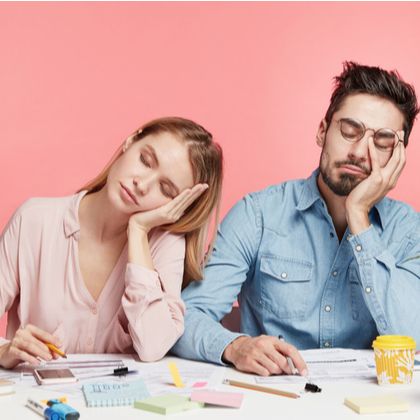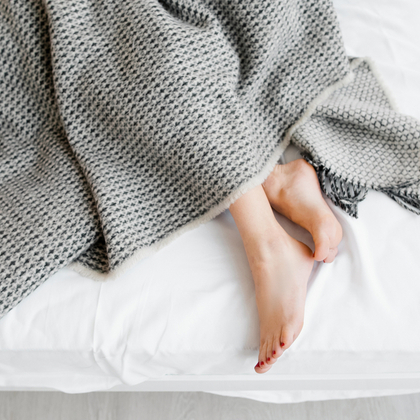
Before the advent of screens and artificial lighting, our sleeping patterns – or circadian rhythms – were governed by sunlight, with many of us spending our evenings in almost total darkness. Now, in our digital age, we can hardly escape the ubiquitous glow of technology. Our nights are illuminated – and it’s costing our sleep.
Exposure to blue light in the evening suppresses melatonin, our sleep hormone, and signals our brain to stay awake when it should be preparing for rest. This disrupts our internal biological clock and leads to poor sleep.
In this article, we take a look at the relationship between blue light and sleep, exploring what blue light is, how it affects sleep, and what can be done to reduce our exposure to it.
What is blue light?
Sunlight or ‘white light’ consists of red, orange, yellow, green, blue light rays – and shades of each colour. Light rays with short wavelengths contain more energy, while those with relatively long wavelengths have less energy. As such, rays on the ‘red’ end of the spectrum have longer wavelengths and, therefore, less energy. On the other hand, rays on the ‘blue’ end of the spectrum have shorter wavelengths and more energy.

Blue light has a wavelength between 380nm and 500nm, making it one of the shortest, highest-energy wavelengths.
Natural vs. artificial blue light: what’s the difference?
Blue light is everywhere. The sun, in particular, emits vast amounts of it. Interestingly, these wavelengths are responsible for giving the sky its blue appearance. We use natural blue light to regulate our 24-hour internal clock. Blue light energises the body, elevating mood, enhancing alertness, and increasing reaction times1. Exposure to natural blue light also helps prepare us for sleep at night2.
However, not all blue light is created equal.
Prolonged exposure to artificial sources of blue light from electronic devices, like laptops, smartphones, and TVs, as well as fluorescent bulbs and LED lights, can negatively impact us. Though these gadgets only produce a fraction of the energy generated by natural blue light, the proximity to our faces and the amount of time spent using digital devices can have adverse effects on our health.
What are the negative effects of blue light?
Heavy exposure to artificial blue light – via a computer or laptop, for instance – is known to lead to digital eyestrain. But perhaps more worrying is the relationship between blue light and sleep. Exposure to blue light can throw our circadian rhythm out of whack and lead to sleep issues.
How does blue light affect sleep?
Our bodies rely on light and darkness cues to regulate sleep. Light signals activity; darkness signals rest. Melatonin, our sleep hormone, is triggered by darkness. Our brain begins releasing this chemical a few hours before we sleep, peaking in the middle of the night.
But exposure to artificial blue light too close to bed can disrupt our biological clock, blocking the body’s natural melatonin production and reducing both the quality and quantity of sleep3.
There’s been a considerable amount of scientific research into blue light and sleep. And experts are unwavering in their opinion that blue light contributes to poor sleep hygiene. In a study published in the Journal of Clinical Endocrinology & Metabolism, researchers found that sleeping in brightly lit room at night suppressed melatonin by 85% in participants, compared to those in a dimly lit environment4.
How to reduce the impact of blue light on sleep patterns?
Although limiting the use of technology isn’t always an option, there are still several practical steps you can take to reduce the impact of blue light on your sleeping patterns.
-
Install blue-light-blocking software on laptops, turn all electronic devices to night-mode in the evening, and reduce the brightness on screens
-
Remove all screens from your bedroom – use an old-fashioned alarm clock instead of your phone to wake you up in the morning
-
Turn all bright lights down in the evening – soft lamps and candles are great alternatives
-
Use dim red lights for night-lights – red light is less able to shift the circadian rhythm and suppress melatonin
-
Embrace morning sunlight – this will help regulate your internal clock and promote quality sleep at night
-
Invest in a pair of blue-blocking amber glasses and wear them in the evenings. Some proponents argue blue light glasses are the most effective way to filter harmful blue light rays. Research shows that wearing blue light blocking glasses, even while using electronic devices or sitting in a lit room, doesn’t inhibit melatonin production5
How long before bed should I avoid blue light?
To support your sleep, try setting yourself a technology curfew in the evening and refrain from using all blue-light emitting devices in the 90-minutes before bed. It can be helpful to make your bedroom a technology-free zone. Consider leaving your phone and all other devices in another room at night.
Does blocking blue light help you sleep?
Making every effort to reduce your blue light exposure in the evening will certainly improve your sleep. Even simple changes to your bedtime routine – turning off the TV earlier, not bringing your phone to bed, or switching off all the main lights in your house – will help. If you want to learn more about protecting your eyes from blue light, take a look at our Vision Hub
You can visit the rest of our dedicated Sleep Health Hub for more helpful articles and advice on supporting your sleep.
References:
-
ScienceDaily. (2019). Blue light may fight fatigue around the clock. Available online: https://www.sciencedaily.com/releases/2014/02/140203191841.htm?
- Münch. M., Linhart. F., Borisuit. A., Jaeggi. S. & Scartezzini. J. (2012). Effects of prior light exposure on early evening performance, subjective sleepiness, and hormonal secretion. Behavioral Neuroscience. 126(1), 196-203.?
- Gooley. J.J., Chamberlain. K., Smith. K.A., Khalsa. S.B., Rajaratnam. S.M., Van Reen. E., Lockley. S. (2011). Exposure to room light before bedtime suppresses melatonin onset and shortens melatonin duration in humans. The Journal of clinical endocrinology and metabolism. 96(3), E463–E472.?
- Gooley. J., Chamberlain. K., Smith. K., Khalsa. S., Rajaratnam. S., Van Reen. E., Zeitzer. J., Czeisler. C. & Lockley. S. (2011). Exposure to Room Light before Bedtime Suppresses Melatonin Onset and Shortens Melatonin Duration in Humans. Endocrinology. 152(2), 742-742.?
- Wood. B., Rea. M., Plitnick. B. & Figueiro. M. (2011). Light level and duration of exposure determine the impact of self-luminous tablets on melatonin suppression. Applied Ergonomics. 44(2), 237-240
Related Posts

Olivia
Olivia Salter has always been an avid health nut. After graduating from the University of Bristol, she began working for a nutritional consultancy where she discovered her passion for all things wellness-related. There, she executed much of the company’s content marketing strategy and found her niche in health writing, publishing articles in Women’s Health, Mind Body Green, Thrive and Psychologies.
View More



